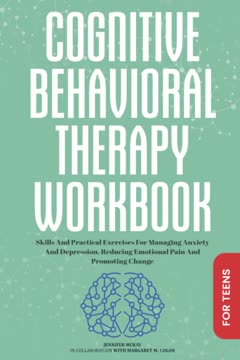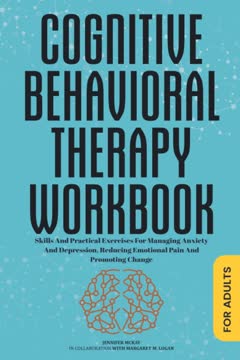Key Takeaways
1. Cognitive Behavioral Therapy (CBT) is a powerful tool for teens' mental health
Cognitive Behavioral Therapy is a therapeutic procedure developed by Aaron Beck in 1964 as a model for mental wellness.
CBT examines thought patterns, behaviors, and emotions. It helps teens develop new healthy habits and positive cognitions that drive their emotions, feelings, decisions, and behaviors. The therapy focuses on the patient's present state and helps detoxify the mind from wrong feelings and thoughts. Through behavior modification and skills training, therapists provide teens with lifelong tools to manage and overcome their symptoms.
CBT is widely applicable and effective. It can be used to treat various mental disorders and behavioral problems in teens, including:
- Social anxiety disorder
- Depression
- Eating disorders
- Attention-deficit/hyperactivity disorder (ADHD)
- Insomnia and sleep disorders
- Low self-esteem and identity issues
2. Teenage challenges stem from internal and external pressures
With several teens hitting the limelight as celebrities and becoming founders and CEOs of various establishments, the bar and expectation have been raised for other teens to measure up.
Societal expectations create pressure. The rise of young celebrities and successful teen entrepreneurs has raised expectations for all teenagers. This can lead to anxiety, stress, and a feeling of inadequacy among those who don't measure up to these high standards.
Peer pressure and societal norms contribute to stress. Teens are highly susceptible to influence from their peers and the media. This can lead to:
- Substance abuse
- Risky behaviors
- Poor self-esteem
- Anxiety and depression
- Identity confusion
Early exposure to adult issues can be problematic. Premature exposure to relationships, sexual content, and adult responsibilities can create mental stress and result in behavioral and cognitive disorders if teens are not prepared to handle these challenges.
3. CBT effectively treats various mental health issues in adolescents
The little research and studies that have been done to probe the effectiveness of cognitive-based therapy for teens have been hugely successful.
Research supports CBT's effectiveness. Studies by the National Institutes of Health (NIH) and the Centers for Disease Control and Prevention (CDC) have shown that CBT is effective in treating depression, anxiety, post-traumatic stress disorder, and disruptive behavior disorder in adolescents.
CBT is adaptable for teens. Therapists work to:
- Develop a friendly relationship and earn trust
- Adapt techniques to the teen's level of understanding and maturity
- Include parents or trusted individuals in the therapeutic process when necessary
- Teach CBT techniques to both patients and parents for continued practice at home
4. Relaxation exercises are crucial for managing stress and anxiety
These simple relaxation exercises can actually do more than just make them relax for therapy, and they can work to improve their general mental and behavioral conditions.
Deep breathing exercise: This simple technique helps allay fears and anxiety and can boost self-confidence. The exercise involves:
- Taking a deep breath in through the nose for 3 seconds
- Holding the breath for 5 seconds
- Gradually releasing the breath through the mouth for 3 seconds
- Repeating this process 10 times, 3 times a day
Imagery awareness exercise: This exercise uses the five senses and imaginary thoughts to keep the mind away from focusing on the present state. It involves visualizing a comforting place or situation and answering questions about what you can see, hear, taste, feel, and smell in that imagined scenario.
Muscle relaxation exercise: This technique involves tensing and relaxing different muscle groups in the body, promoting overall relaxation and stress relief.
5. Setting SMART goals helps teens focus and overcome challenges
Make sure you set goals that are reasonable, it shouldn't be something outrageous. If they are something too high or outside your scope of attainment, you've definitely set yourself up for failure.
SMART goals provide structure and direction. The SMART acronym stands for:
- Specific: Clear and well-defined goals
- Measurable: Quantifiable progress and success criteria
- Achievable: Realistic and attainable objectives
- Realistic & Resourced: Goals aligned with available resources and capabilities
- Time-limited: Set deadlines for accomplishment
Goal-setting promotes focus and motivation. By setting SMART goals, teens can:
- Break larger objectives into manageable steps
- Track their progress and celebrate small victories
- Identify obstacles and develop strategies to overcome them
- Build confidence through achieving realistic targets
6. Cognitive disputation techniques challenge negative thought patterns
REMEMBER: you thinking about something doesn't mean it is real, truth or valid. And most times for you to feel better, all you have to do is to change the thoughts you're having.
Thought record worksheets help identify unhelpful thoughts. These worksheets guide teens to:
- Recognize triggering situations
- Identify emotions and physical sensations
- Analyze unhelpful thoughts or mental images
- Gather evidence for and against these thoughts
- Develop alternative, balanced perspectives
Cognitive disputation exercises promote balanced thinking. Techniques include:
- The "4 levels of abstraction" exercise to create distance from thoughts
- The "Testing your thoughts" exercise to verify thought authenticity
- The "Wise mind" worksheet to balance emotional and rational thinking
7. Building self-esteem and confidence is essential for teen development
Are there things you can do to balance your emotions? What are the things you can stop doing?
Self-esteem exercises promote self-awareness and appreciation. Teens are encouraged to:
- List personal values, skills, and positive attributes
- Identify compliments received from others
- Practice positive self-talk and affirmations
- Celebrate small successes and achievements
Confidence-building activities push teens out of their comfort zone. These include:
- Trying new activities or visiting unfamiliar places
- Engaging in conversations with strangers
- Identifying and pursuing personal passions and interests
- Reflecting on past successes and overcome challenges
8. Forgiveness is a key component of mental well-being for teenagers
Forgiving helps you move on and see the light of hope for yourself. This will help you do greater things in the future and also avoid the mistakes of the past.
Understanding forgiveness is crucial. Forgiveness is:
- Letting go of resentment and anger
- Recognizing the human nature of wrongdoers
- An opportunity for personal healing and growth
- A process that develops over time
Forgiveness is not:
- Condoning or excusing harmful actions
- Forgetting what happened
- Agreeing to continue a relationship as before
- Simply saying "I forgive you" without meaning it
Practicing forgiveness promotes mental health. Benefits include:
- Reduced symptoms of anger, anxiety, and depression
- Increased hope and self-esteem
- Improved relationships and social connections
- Enhanced ability to move forward and focus on personal growth
Last updated:
Download PDF
Download EPUB
.epub digital book format is ideal for reading ebooks on phones, tablets, and e-readers.





